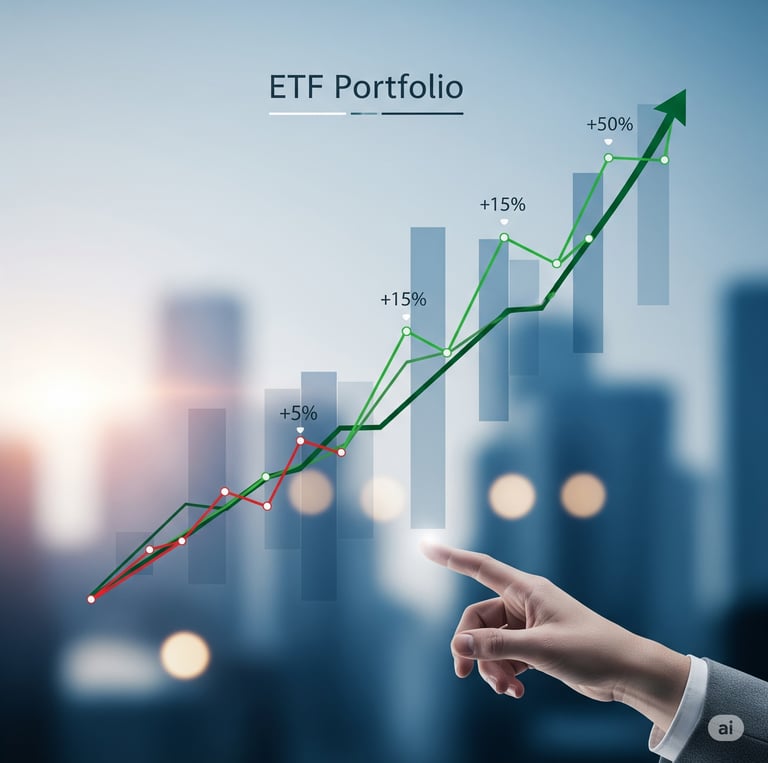Empowering Your Retirement Journey
Building Lasting Wealth: The Strategic Advantage of Long-Term Investing with ETFs
In the world of finance, true wealth creation is rarely the result of a lucky stock pick or a frantic market trade. More often, it is the product of discipline, patience, and a sound strategy consistently applied over time. This is the essence of long-term investing—a methodology that prioritizes "time in the market" over "timing the market."
For Canadian investors looking to build a robust portfolio for retirement, education, or other significant life goals, Exchange-Traded Funds (ETFs) have emerged as an exceptionally powerful tool. Let's explore why a long-term approach combined with the benefits of ETFs, like those offered by pioneers such as Vanguard and others, is a cornerstone of modern wealth management.
The Core Principle: Why Long-Term Investing Works
Long-term investing is a strategy that involves holding investment assets for a period of several years to decades, allowing them to grow through the power of compounding. By reinvesting dividends and capital gains, your initial investment generates earnings, which in turn generate their own earnings. This "snowball effect" is the single most powerful force in building wealth.
A long-term perspective allows an investor to ride out the inevitable waves of market volatility.3 Short-term market fluctuations, or "noise," become less significant when your investment horizon is measured in decades, not days.
Enter the ETF: A Modern Tool for a Timeless Strategy
An Exchange-Traded Fund (ETF) is a type of investment fund that holds a collection of assets—such as stocks, bonds, or commodities—and trades on major stock exchanges, much like an individual stock.4 Think of it as a basket containing dozens, hundreds, or even thousands of individual securities.
This structure provides several key advantages for the long-term investor:
1. Instant Diversification: Purchasing a single share of a broad-market ETF can give you exposure to an entire index, such as the S&P 500 or the TSX Composite. This inherent diversification mitigates the concentration risk associated with holding a small number of individual stocks. A single company may fail, but it is highly improbable that an entire market index will go to zero.
2. Low Cost: Fees are a primary determinant of net returns. ETFs, particularly passively managed index funds, are renowned for their low Management Expense Ratios (MERs). Providers like Vanguard have built their reputation on minimizing costs, ensuring that more of your money stays invested and working for you. Over 30 years, a 1% difference in fees can reduce your final portfolio value by nearly 30%.
3. Transparency and Liquidity: The holdings of most ETFs are disclosed daily, so you know exactly what assets you own. Furthermore, because they trade on an exchange, you can buy or sell them at any point during the trading day at the current market price.
4. Tax Efficiency: ETFs are generally structured to be tax-efficient, especially when held within registered Canadian accounts like a Tax-Free Savings Account (TFSA) or a Registered Retirement Savings Plan (RRSP).In a TFSA, all growth and withdrawals are tax-free. In an RRSP, your contributions are tax-deductible and the investments grow tax-deferred until withdrawal.
Disclaimer: This article is for informational purposes only and should not be considered as financial or investment advice. You should consult with a qualified professional before making any investment decisions.


The Vanguard Example: A Focus on the Investor
Vanguard has long been a leader in popularizing low-cost, passive investing. By structuring their business to prioritize investor returns (in the U.S., they are owned by their funds, which are in turn owned by shareholders), their philosophy has always revolved around driving down costs.
For Canadian investors, this translates into a suite of excellent, low-MER ETFs. A few noteworthy examples include:
Vanguard S&P 500 Index ETF (VFV.TO): Provides exposure to the 500 largest U.S. companies. (my absolute favorite!)
Vanguard FTSE Canada All Cap Index ETF (VCN.TO): Offers broad exposure to the Canadian stock market.
Putting It Into Practice: A Simple Path Forward
Getting started doesn't need to be complex. A winning strategy can be as simple as this:
Define Your Goals and Risk Tolerance: Are you saving for a retirement 30 years away or a down payment in 7? Your timeline will influence your ideal asset allocation (mix of stocks and bonds).
Automate Your Contributions: Set up regular, automatic contributions to your investment account. This strategy, removes emotion from the equation, don't try to time the market!
Stay the Course: Once your plan is in place, the most important step is to stick with it. Ignore the daily market news and resist the temptation to make changes based on fear or greed. This is very hard and where more people fail, some days will feel like the sky is falling and your investments are down 20%. Being calm and thinking long term has proven to be the most successful strategy for most people
Conclusion
Building significant wealth is a marathon, not a sprint. By adopting a disciplined, long-term perspective and utilizing the powerful, low-cost, and diversified nature of ETFs, you can position your portfolio for sustainable growth. Tools from providers like Vanguard have democratized investing, making it easier than ever for Canadians to build a secure and prosperous financial future.
Disclaimer: This article is for informational purposes only and should not be considered as financial or investment advice. You should consult with a qualified professional before making any investment decisions.
